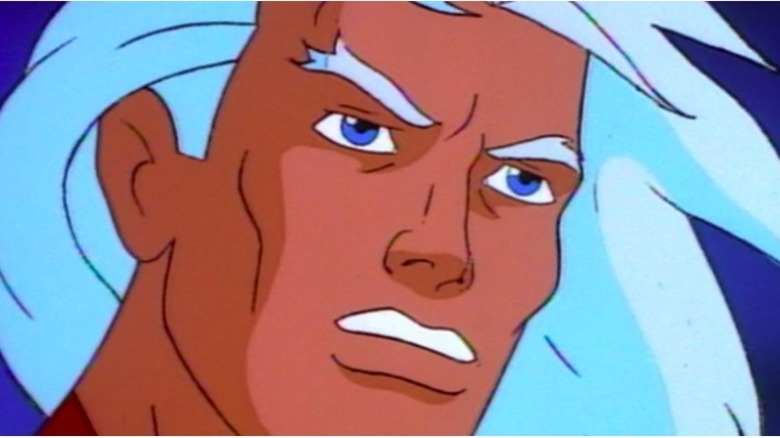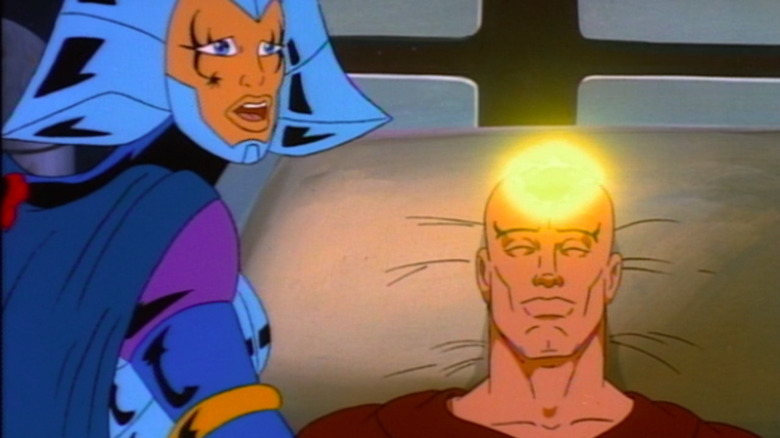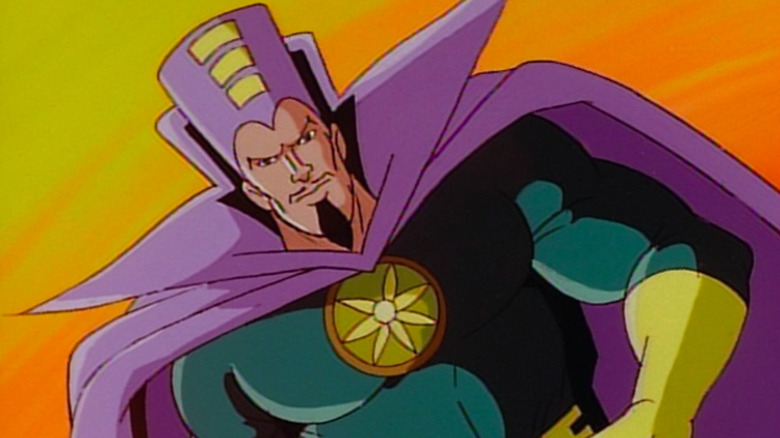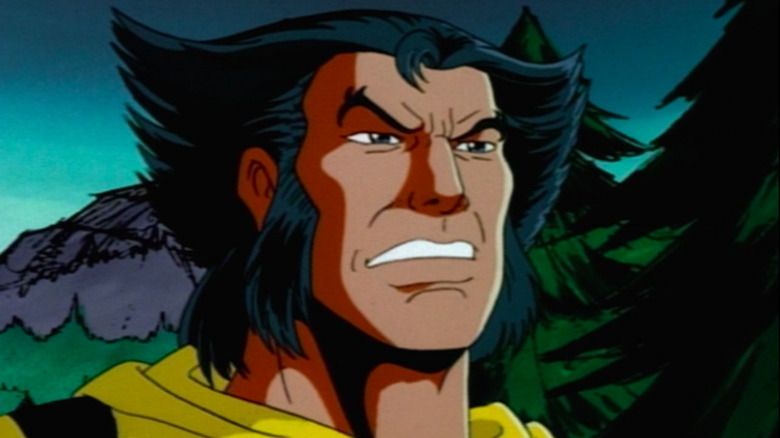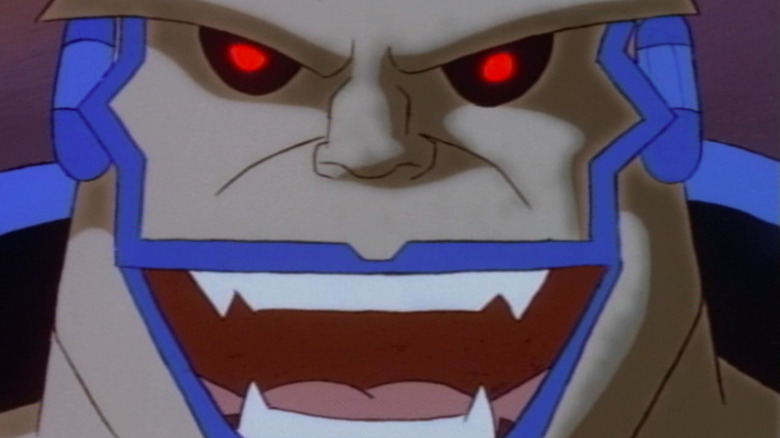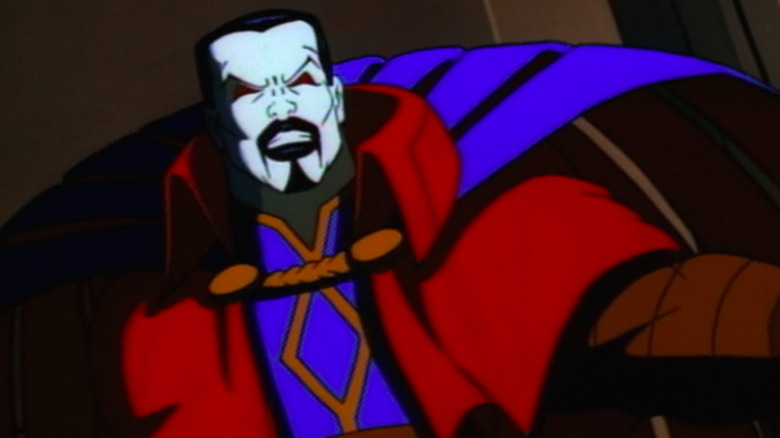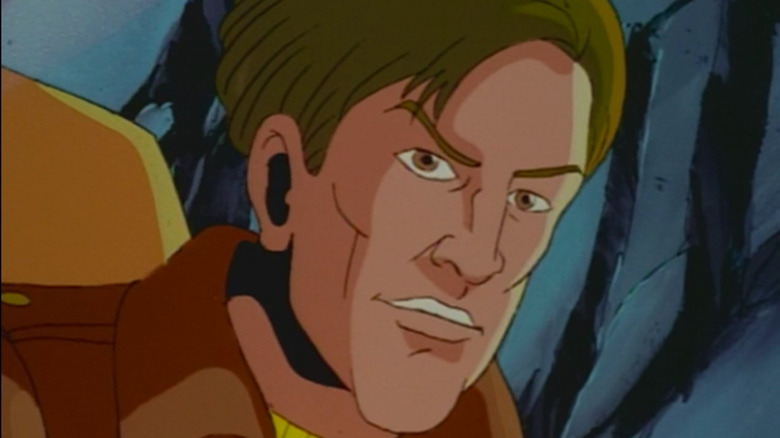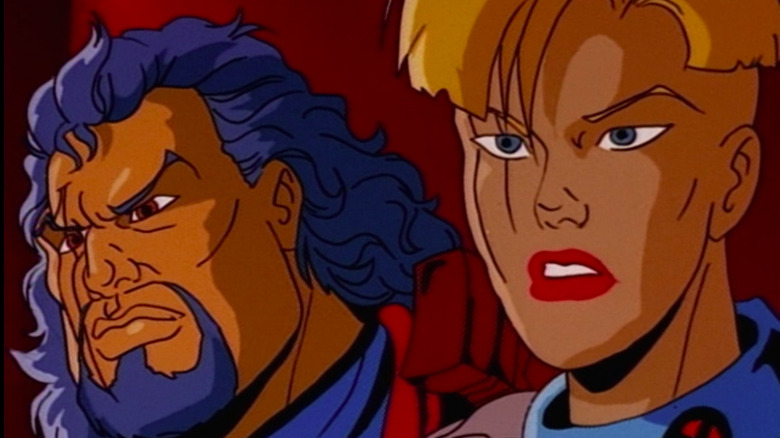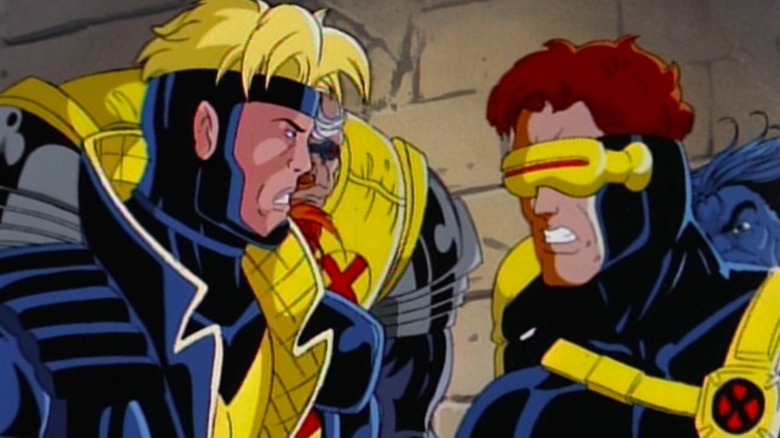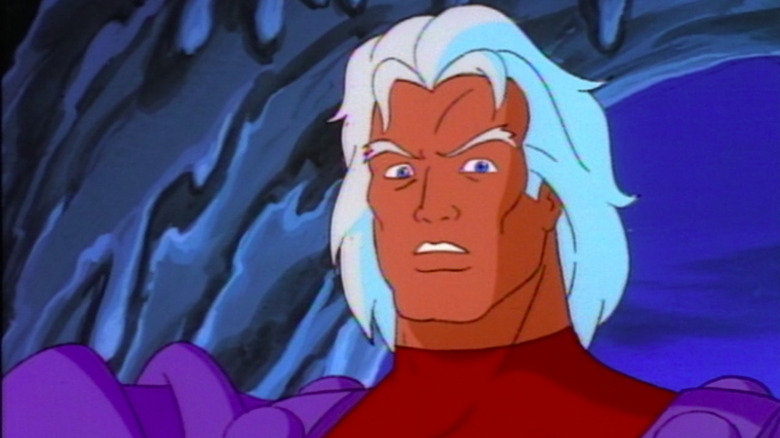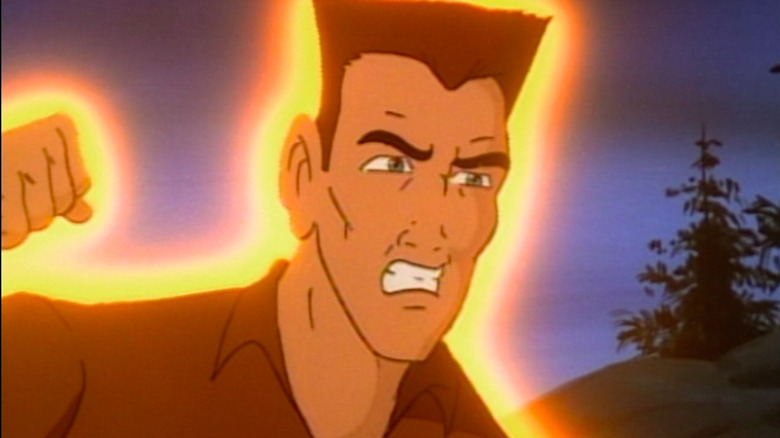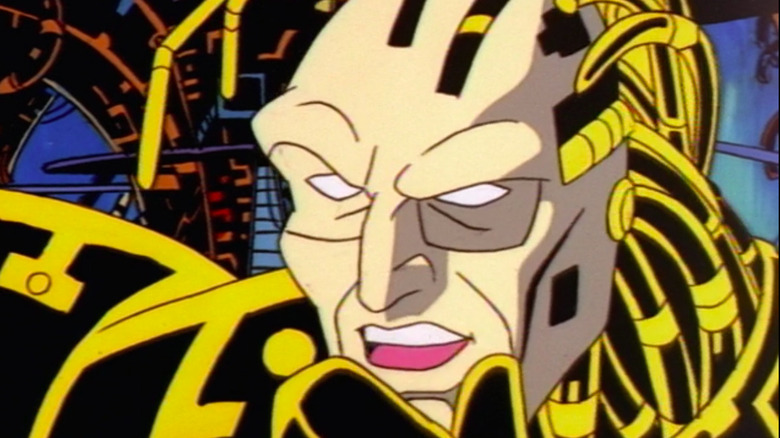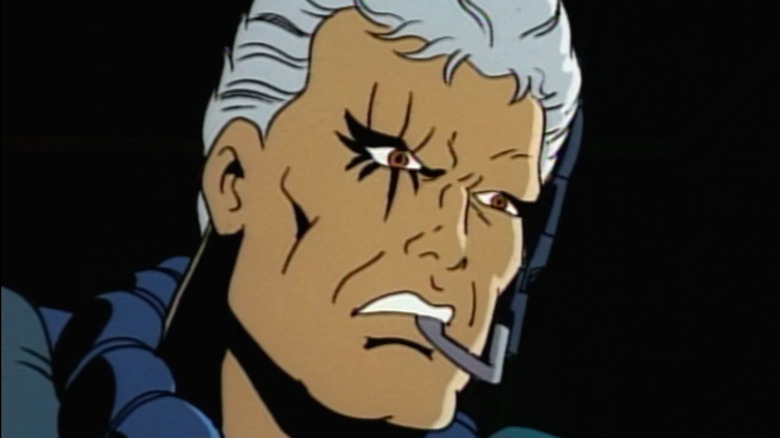12 Dangling Plot Threads X-Men '97 Could Resolve
If you're a fan of "X-Men: The Animated Series" and your imagination is swimming from Marvel's announcement that the series is returning as "X-Men '97," you're probably not alone. For many fans of the original show (also simply known as "X-Men" or "XTAS"), the series' Disney+ continuation is the chance they've been waiting for to finally revisit one of the versions of Marvel's Merry Mutants they love best.
The return of "X-Men" also allows the cartoon to revisit some unfinished business, namely plots that the series never quite got to resolve the first time around. In the last two seasons alone, for instance, a major non-X-Men villain made his presence known and a powerful foe returned, while a crucial character exited after a shocking tie between him and a familiar enemy was revealed. In case it's been a while and your memory needs refreshing, or if you're new to the show and simply curious, read on and learn just what ends "X-Men '97" could tie up when it makes its highly anticipated debut in 2023.
Professor X leaving Earth to be healed
The "X-Men" series finale "Graduation Day" sees Xavier, already in delicate health after weeks of opposing a proposed mutant containment bill, mortally wounded by Henry Peter Gyrich's energy disruptor. Charles is rushed to the X-Mansion for treatment, but no medical procedure on Earth seems able to save him, prompting Beast to propose contacting the Shi'ar Empire. With unexpected help from Magneto, the X-Men successfully contact Shi'ar Empress Lilandra Neramani through her psychic rapport with Charles, and Lilandra takes Xavier so Shi'ar medicine can help him live. Even though, as Charles reveals, he may never heal to the point where he can physically return to Earth safely.
It's a heartbreaking final episode that raises a lot of questions. Is Xavier right? Can he only live among the Shi'ar now, unable to reunite with his beloved X-Men? This is, without doubt, the biggest lingering plot point on the show. Series showrunner Eric Lewald has even mused over how it might be resolved in his book, "Previously on X-Men: The Making of an Animated Series" (via Geeks of Color), suggesting the professor's ultimate fate be determined when the X-Men join him in saving the Shi'ar Empire from catastrophe.
Whether "X-Men '97" will use this plot remains to be seen. Still, given that Marvel revealed that "XTAS" veterans Eric and Julia Lewald are involved as consultants on the show, it's highly likely Xavier's status quo will be addressed in some way.
Bender revealing he's Immortus
Bishop enters the action a little late in the four-part epic "Beyond Good and Evil," as he first ends up lost in the Axis of Time. There, he encounters the realm's purported creator, Bender, who proceeds to drive Bishop up a wall with his riddles, celebrity impressions, and comical antics. Bishop soon discovers he's within walking distance of the man whose actions trapped him in the Axis, Apocalypse, and joins the fight to take him down. Apocalypse's defeat restores time to normal and causes Bishop and everyone else in the Axis to vanish and save Bender, who then reveals what is apparently his true form — Immortus, Marvel Comics' overseer of time and lord of Limbo.
For diehard Marvel Comics fans, the reveal must have been a surprise, but not one too far out of left field. After all, the fortress in the Axis of Time that Apocalypse uses as his headquarters is the spitting image of Immortus' castle. It's never outright said why Immortus appears to Bishop as Bender, though it may have been an unintentional side effect of Apocalypse mucking with time, rather than a deliberate choice. Either way, he's a character ripe for revisiting, given his importance to the Marvel Universe. It could even open the door for an X-Men/Avengers crossover, given how Immortus is usually an Avengers villain. Plus, with Immortus around, his younger self, Kang the Conqueror, is sure to follow.
Wolverine's origin
A relatively faithful adaptation of "Wolverine" #50 by Larry Hama and Marc Silvestri, "Weapon X, Lies and Videotape" reveals that many of Wolverine's memories of his past are fabrications of the Weapon X program. The same holds true for Wolverine's fellow Weapon X initiates, Sabretooth, Maverick, and Silver Fox, the last of whom Logan remembers having a relationship with — one of the few recollections from his early days, it turns out, that may actually be true.
The episode is pretty true to the comics of the era in general, as back in the 1990s, Wolverine's past was still largely a mystery to him and his fans. In the years since "X-Men: The Animated Series" ended, however, Marvel Comics decided it was high time to show the world Logan's early days in detail, most notably in the miniseries "Origin." Later, Marvel even has Wolverine remember his true memories at the end of the crossover "House of M." While there's certainly a case for keeping Wolverine's past a mystery, "X-Men '97" could always follow in the comics' footsteps and have him finally remember the parts of his life Weapon X wanted him to forget.
Apocalypse's return
En Sabah Nur, aka the millennia-old mutant Apocalypse, seemingly meets his end at the finale of "Beyond Good and Evil." Yet, just like in the comics, Apocalypse is too stubborn to go down for good. In "The Fifth Horseman," his spirit tasks his new acolyte (pun intended), Fabian Cortez, with bringing him a mutant host body he can inhabit. When Cortez's chosen vessel, Jubilee, escapes with Beast and Caliban's help, however, Apocalypse simply takes Cortez's body instead, immediately transforming it to resemble Nur's original form.
The return of such a major X-Men enemy is just begging for a follow-up. Just what grand scheme does Apocalypse have planned next? Does possessing Fabian Cortez's body give Nur access to Cortez's powers, as well? While Fabian's soul seems to be driven out from his body right before the possession, is there still a sliver of his essence left who could fight back against a psyche as powerful as Apocalypse's and regain control? All of that remains to be seen.
Mister Sinister's historical connection to Professor X and Jean Grey
Mister Sinister suggests his interest in Cyclops and Jean Grey is purely scientific when the three first meet in "X-Men: The Animated Series." The flashback episode "Descent," however, suggests Sinister may have a more personal link with Jean, as it introduces his ailing wife, Rebecca, whose maiden name is also Grey. Additionally, "Descent" presents Charles Xavier's 19th-century ancestor, Dr. James Xavier, Rebecca's physician and a friend to Sinister's human alter ego, Dr. Nathaniel Essex. Xavier has a falling out with Essex, however, when he learns that the future villain is conducting unethical experiments on mutants to find both a cure for his wife and a way to transform himself into a mutant.
While Rebecca exists in the comics, she's only referred to as "Rebecca Essex," and her maiden name is never revealed. If Rebecca and Jean are indeed relatives on the show and their shared surname isn't a coincidence, then that means Jean and Sinister are technically also related, further explaining Sinister's obsession. Given how Sinister medicates Rebecca with a similar (if not the same) potion to the one that turns him into a mutant, Essex might even be responsible for Jean's mutant powers if the elixir's effects are hereditary. Similarly, "Descent" also makes Sinister's feud with Professor X much more personal, as James Xavier never brings Essex to justice in his lifetime. Perhaps "X-Men '97" could explore these (dare we say it?) sinister connections in more detail.
Will Morph finally rejoin the X-Men for good?
Morph is fairly unique in that he debuted on "X-Men: The Animated Series" rather than the comics, although he's loosely inspired by comic character Changeling. As Eric and Julia Lewald, who worked on the show as showrunner and writer, respectively, explain to AIPT!, Morph's death in the two-part series pilot "Night of the Sentinels" was planned from the start, but fan demand led to his return in the show's second season.
In Season 2, it's revealed that Morph's body is taken by Sinister and resuscitated, but he is brainwashed into seeking revenge on the X-Men. With Professor X's help, Morph finally regains full control of himself and is later taken to Muir Island so his mind can be properly healed. When he tries rejoining the X-Men in "Courage," however, he changes his mind when realizing he still hasn't fully recovered from the trauma the Sentinels gave him.
In short, Morph's arc on the show has been all about trying to work his way back to the X-Men but always finding something in the way. The character returns in the series finale "Graduation Day" to see the ailing Charles Xavier and briefly pose as the professor to discourage war, but whether he stays for good afterward remains unknown. "X-Men '97" could remedy that and finally get Morph back on the team for good, or at least have him continue to appear as an occasional ally to his old teammates.
Will Bishop and Shard ever fix their dystopian future?
Changing the course of history can be a tricky ordeal, as Shard and Bishop learn the hard way. In "Days of Future Past," Bishop travels back in time to stop the assassination of Senator Robert Kelly, which leads to Sentinels taking over the world and hunting down most mutants. While Kelly's murderer is stopped in the present, Bishop finds nothing has changed when he returns to the future, leading Forge, the person who sent him to save Kelly, to posit that something new has caused their dystopia. A new inciting incident is revealed in the two-part story "Time Fugitives," which explains the Sentinels have been replaced by a techno-virus created by Apocalypse in the present day.
While Bishop stops Apocalypse's plague early with Cable and Wolverine's help, his own era is once again plagued by Sentinels as a result. Later, he teams up with his sister Shard, along with alternate versions of Wolverine and Storm, to stop Charles Xavier from being murdered in 1959. Bishop and Shard then aid the present-day X-Men in stopping Apocalypse from rewriting history.
In short? Bishop and Shard can't catch a break, but their exploits are a blast to watch. "X-Men '97" could chronicle more of their time travel missions or have them stay in the present and join the X-Men, which Eric and Julia Lewald tell Polygon was going to happen in the original series. Alternately, Shard could join X-Factor, as she does in the comics.
Cyclops and Havok don't know they're brothers
Cyclops and Havok don't exactly get off on the right foot when they meet in "Cold Comfort." The two square up as part of a battle between the X-Men and X-Factor, in which they look each other over before Cyclops tells his younger sibling, "I don't like your attitude." A fight ensues, and the two unleash their powers on each other but are shocked to find that both their energy blasts do nothing.
As the comic book faithful know, Cyclops and Havok have always been immune to each other's powers because they're brothers. This quirk doesn't apply to all mutant siblings, but it does to them, and, to varying degrees, their other comic book brothers, Adam X and Vulcan. "XTAS" never got around to having Cyclops and Havok learn they're related, making that revelation — not to mention a brotherly reunion — long overdue. "X-Men '97" could even make a family reunion out of it and have them meet with Corsair, whom Cyclops learns is his father in "Orphan's End."
Magneto's actions after the series finale
The X-Men find Magneto up to his usual tricks in the X-Men series finale "Graduation Day," ready to lead an army of mutants gathered by Sunfire into war against humans in retaliation for Gyrich's attack on Xavier. He is stunned, however, when Cyclops, Wolverine, and Jean Grey tell him Xavier's on the brink of death, and reluctantly puts his plans of retribution aside when Jean explains Magneto's powers can help Charles contact Empress Lilandra, the one person who can still save Magnus' old friend.
Magneto's efforts to boost Charles' telepathy with electromagnetism work and he is seen standing alongside the X-Men as Lilandra takes Xavier with her into space. Yet what happens afterward? Does Magneto take a page from "Uncanny X-Men" #200 (the story "Graduation Day" is based on) and stay behind as an ally to the X-Men? Or does he return to his army on Genosha, even more compelled to wage war on humanity after learning Xavier may never return to Earth?
His choice can finally be explored in "X-Men '97," as can the effects it has on the mutants Magneto had planned to guide into battle. Will Sunfire, for instance, lead the war if Magneto does not? Or will Apocalypse or a character not yet introduced to the series, such as Magneto's faithful follower Exodus, claim Magneto's former army as their own? Given the passing of Magneto's actor, David Hemblen, it's also possible the character might be retired to honor Hemblen's memory.
Cannonball's open invitation to the X-Men
Fans of the comics know that the X-Men are far from the only mutant superhero team out there. Other than X-Factor, though, other superhero groups are not seen all that much in the original "X-Men: The Animated Series." The episode "Hidden Agendas," however, opens the door for a future New Mutants or X-Force appearance by introducing one of the two teams' most prominent members, Samuel Guthrie, alias Cannonball.
While Sam chooses not to go to Xavier's school, deciding instead to help his family find a safer living situation after an anti-mutant mob appears outside their home, he also suggests his mind might change in the future. There just might come a day, therefore, where Sam is regularly frequenting the halls of the X-Mansion. Perhaps he'll even form a version of the New Mutants in "X-Men '97," or meet Cable and skip right to X-Force? After all, one of his fellow New Mutant teammates from the comics, Wolfsbane, is already on her "grown-up" team, X-Factor on the show, while another, Warlock, is a little busy co-ruling his home planet.
Cameron Hodge and Project: Wideawake
He may not be as showy a villain as the Sentinels or Mister Sinister initially, but Cameron Hodge is not to be underestimated. Hodge first appears in the series as the development advisor to the government of Genosha, which is an island secretly using mutants for labor. There he informs Gyrich about Cable, who starts as a mercenary of the Genoshan army before learning what the nation's ruler, the Leader (not to be confused with the Hulk villain), is doing to other mutants.
Hodge is then seemingly carried away by water currents, along with the Leader and Cable, but returns in "The Phalanx Covenant." Hodge has been absorbed into the Phalanx collective and is aiding their efforts to assimilate Earth. Once the Phalanx is destroyed with a virus fashioned by Beast, Forge, Moira MacTaggert, Amelia Voght, Banshee, and Mr. Sinister, however, Hodge reverts to human form, to his great anguish.
Yet defeat never seems to keep Hodge down. Though not seen in the episode, he is referenced in "Hidden Agendas" by Kirkland. This is significant because Kirkland is an agent of a covert military program dedicated to mind-controlling mutants with technology with connections to Project: Wideawake, the U.S. government's mutant watchdog organization. With Hodge still active, he could easily rear his head again alongside Kirkland and Project: Wideawake to cause even more trouble for the X-Men, especially since Kirkland deems the X-Men his top priority in "Hidden Agendas."
The son Cyclops doesn't know he has
That's right — Cyclops has met two major relatives on the show that he doesn't know about, which features his brother Havok and his son Cable. The latter is even more shocking considering that Jean Grey, who is Cable's stepmother in the comics, does know. Jean discovers hers and Cyclops' link to Cable when scanning his mind in the second part of "Time Fugitives" to see where the time traveler plans on body sliding with Wolverine. Later, when Cyclops asks her about Cable's identity and motives, Jean cryptically responds, "He's more important to the future – our future — than you could ever imagine."
It's pretty clear she's referring to her and Cyclops' family connection, especially since earlier in the episode, Cable reveals he's already familiar with the two X-Men when he asks his computer to give him a rundown of the team's members. Jean never reveals why she doesn't tell Scott about their son, which is something "X-Men '97" could go into, as well as finally let Cyclops in on the big secret. That is, assuming it doesn't jeopardize Cable's existence.
Unlike the version from the comics, which is from an alternate timeline, this Cable is from Cyclops and Jean's actual future. However, should Cyclops play a smaller role in "X-Men '97," due to actor Norm Spencer's passing, another option would be to have Jean and Cable bond as they did during the X-Men comics' "Revolution" era of 2000 to 2001.
